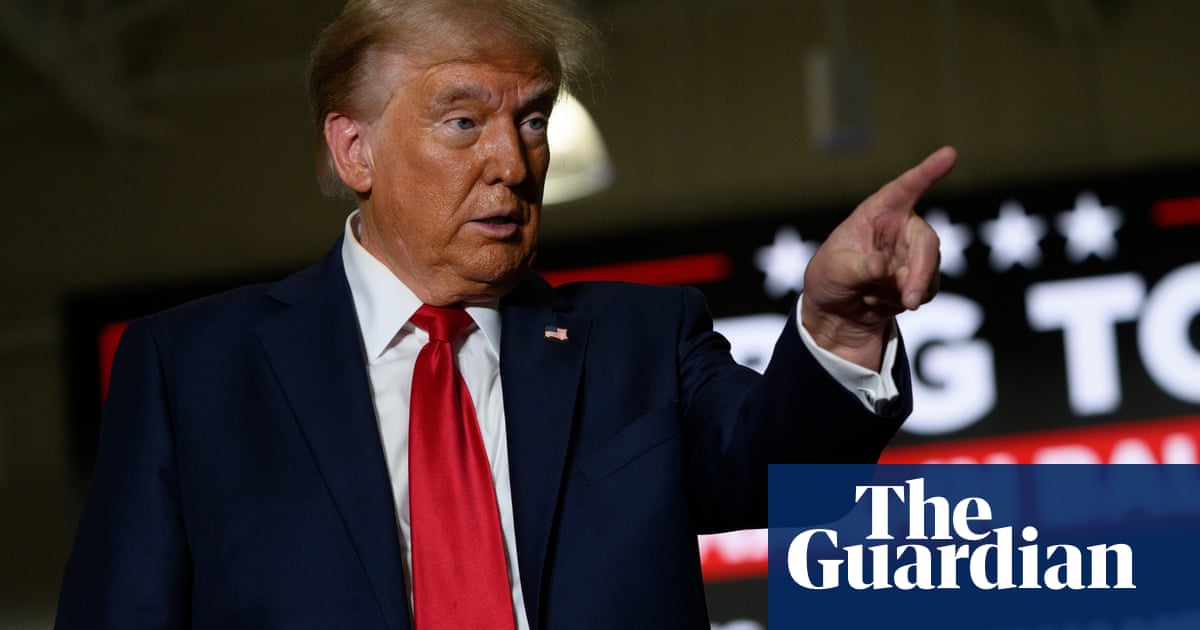Donald Trump has been accused of invoking plotlines similar to The Purge â a dystopian horror film in which officially sanctioned murder is occasionally legal â as a possible solution to crime in the US after saying it could be eradicated in âone really violent dayâ.
In what was seen as an extreme display of demagoguery even by his standards, Trump drew cheers from an audience in Erie, Pennsylvania, with a picture of an out-of-control crime spree that he said could be ended âimmediatelyâ with one âreal rough, nasty dayâ, or âone rough hourâ.
âYou see these guys walking out with air conditioners with refrigerators on their back, the craziest thing,â Trump said. âAnd the police arenât allowed to do their job. Theyâre told, if you do anything, youâre gonna lose your pension.
âTheyâre not allowed to do it because the liberal left wonât let them do it. The liberal left wants to destroy them, and they want to destroy our country.â
In a passage that provoked a storm on social media, the former president and Republican nominee then said: âIf you had one day, like one real rough, nasty day with the drug stores as an example, where, when they start walking out with â¦â
He then trailed off in a digression to falsely accuse Kamala Harris, the Democratic nominee, of introducing a practice in California when she was attorney general that exonerated thieves from prosecution of items worth less than $950.
Politico said the remark appeared to be a reference to proposition 47, which downgraded some offenses from felonies to misdemeanor and was signed into law by the stateâs former Republican governor, Arnold Schwarzenegger, four years before Harris took office.
Linking that issue to his theme, Trump continued: âYou saw kids walk in with calculators. They didnât want to go over the $950. Theyâre standing with calculators adding it up. You know, these are smart, smart people. Theyâre not so stupid, but they have to be taught.
âNow, if you had one really violent day ⦠one rough hour, and I mean real rough. The word will get out and it will end immediately.â
The comments triggered a stream of comparisons to The Purge, a 2013 film that depicts the election of a radical new party called The New Founding Fathers of America following an economic collapse, which then enacts drastic policies to end crime and unemployment.
The criticism was reiterated by Jon Lemire, a host on MSNBCâs Morning Joe, who told viewers: â[Trump] did suggest that there should be an hour of violence, which sounds like the plot of the movie The Purge, which is deeply dangerous.
âWe know how his words have inspired violence before, including, but not limited to January 6 ⦠This is an extraordinarily dangerous closing argument and vision for America.â
In the film, the US is depicted as becoming virtually crime- and unemployment-free by 2022 following a policy of legalising all crime, including murder, and making emergency services unavailable for a period of 12 hours each year.
Even before the comparisons, Trumpâs campaign issued a denial that his remarks amounted to a policy proposal.
A campaign official told Politico that the ex-president was âclearly just floating it in jestâ.
Steven Cheung, the campaign communications director, told the site in a statement that Trump was reasserting his supposed credentials as âthe law-and-order presidentâ.
âHe continues to reiterate the importance of enforcing existing laws,â he said. âOtherwise itâs all-out anarchy, which is what Kamala Harris has created in some of these communities across America, especially during her time as [California] Attorney General when she emboldened criminals.â
Trump, who was convicted of 34 felonies by a New York court in May on charges relating to hush-money payments to a porn actor but has insisted he is the innocent victim of a witch-hunt, has a history of urging harsh punishments for others accused of crimes.
Last year, he advocated allowing police to shoot shoplifters. In 1989, he notoriously took out a full-page newspaper advert arguing for the death penalty amid an outcry over the violent rape of a jogger in New Yorkâs Central Park. Five Black and Latino boys arrested and jailed for the crime were subsequently found to have been wrongly convicted.



